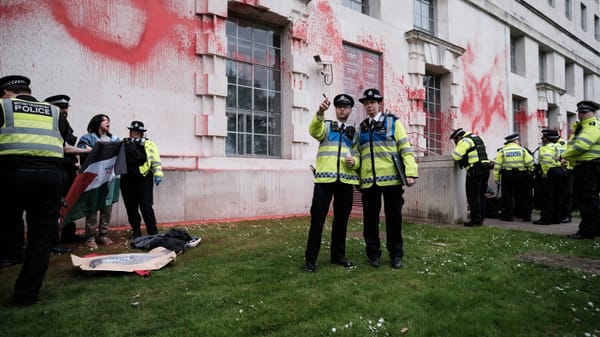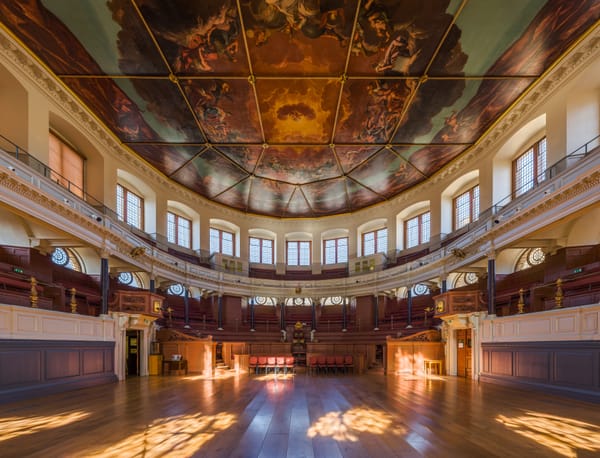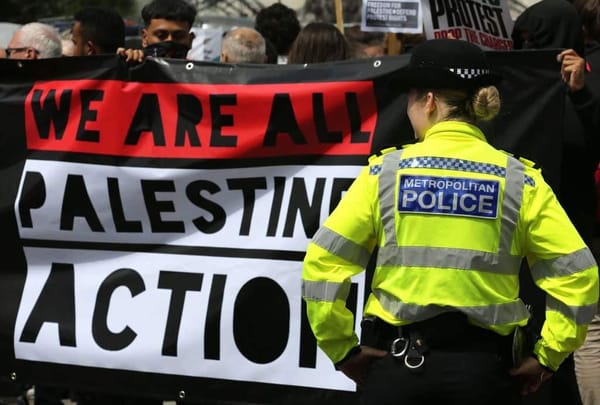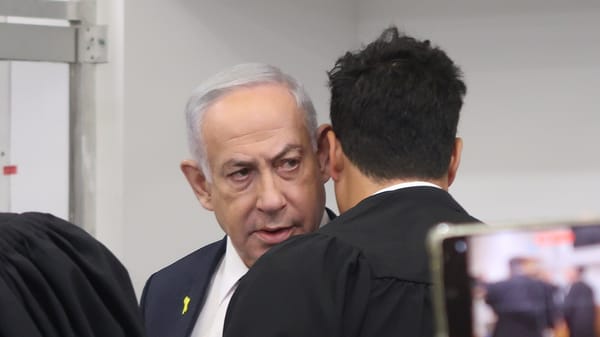Resistance from within: Silenced Israelis speak out
Portraits of the activists defying repression and persecution to protest Israel’s bombardment of Gaza.
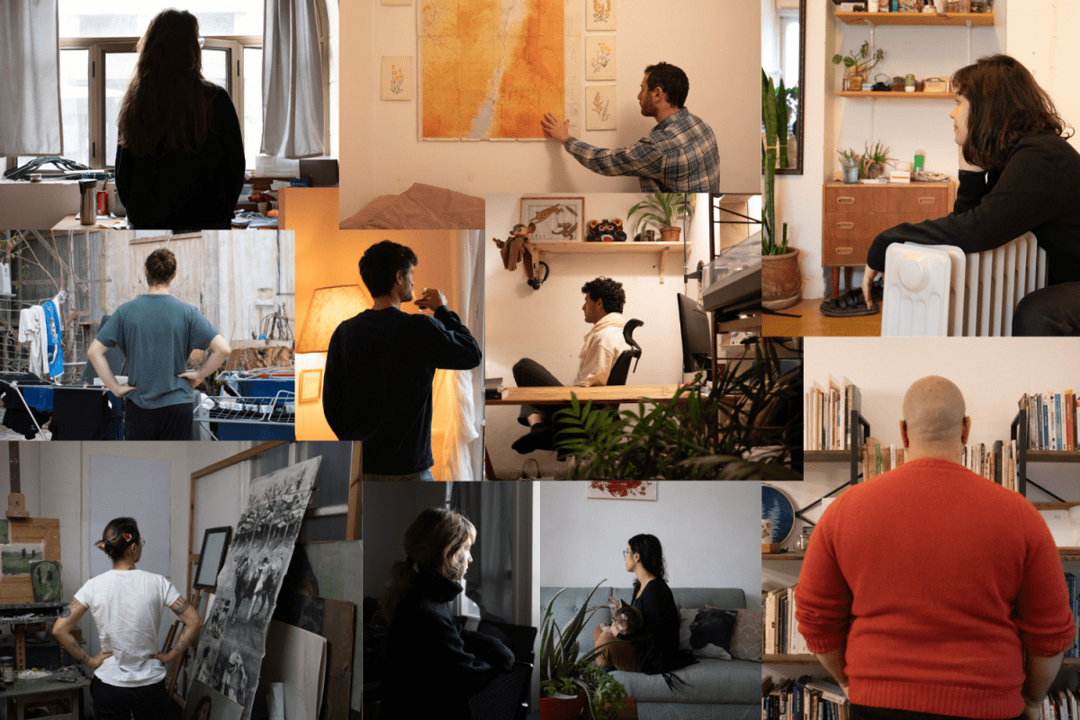
On the evening of 26 February, a right-wing mob gathered outside the family home of Israeli journalist and filmmaker Yuval Abraham. Two days earlier, his film No Other Land (co-directed with Basel Adra, Hamdan Ballal and Rachel Szor), which documents Israel’s policies of expulsion in the area of Masafer Yatta in the southern West Bank, had won the Best Documentary Award and the Audience Favorite Documentary Award at the Berlinale film festival in Berlin. In his acceptance speech alongside Adra, for whom Masafer Yatta is home, Abraham seized the opportunity to remind the audience that when the pair leave Germany and return to Israel-Palestine, they will go back to being unequal under an apartheid regime.
His speech quickly went viral online, and the Israeli media took note: Kan, Israel’s public broadcaster, ran a segment calling Abraham’s words antisemitic (before later retracting it). From that moment on, Abraham became the target of a right-wing hate campaign, receiving a barrage of death threats. The aforementioned mob arrived at his family home in southern Israel to search for him (Abraham was still in Berlin), forcing his family to flee in fear for their own safety.
Since the Hamas-led 7 October assault on southern Israel, it has been more dangerous than ever for Israeli leftists to speak out critically against their government. Police have repressed anti-war protests with an iron fist. Hundreds of people – most of them Palestinian citizens – have been arrested or detained on the basis of social media posts. Students and academics have been suspended and even fired for expressing opposition to Israel’s brutal assault on Gaza. And several people, like Abraham, have been the target of doxxing, with right-wing Israelis sharing their address and other personal information online in order to generate hate campaigns against them.
In December, I decided to embark on a photography project to shed light on this climate of fear and silencing. I visited the homes and workplaces of young Jewish-Israeli anti-war activists and photographed them with their faces obscured, so they couldn’t be identified. I have included only their first names (some of which have been changed to further protect their identity), and a fragment of information about them and how they view the present moment. What emerges is a picture of how the occupation consumes not just the occupied population, but the occupying society itself.

Noa, 38, is the director of a critical language school teaching Hebrew, Arabic and English. Since October, she has attended all of the anti-war protests in Tel Aviv.
“The prevailing sentiment, often expressed as ‘this is not the time [for criticism]’, became a suffocating force. The atmosphere became more and more daunting. Fear permeated and paralysed almost every protest action, with threats and persecution of activists, and violent dispersal and arrests at demonstrations. A teacher was arrested because he published the names of dead Gazans.”

Yarden, 27, is an ex-orthodox Jew, whose entire family remains religious. Some of them live in settlements in the West Bank and also enlisted in the army’s reserves following the outbreak of the war.
“It’s always hard for us to talk and there is a constant fear that an argument will break out. But now my brothers simply don’t talk to me or invite me over.”

Lena, 38, is a tattoo artist and mural painting conservator. She has been trying to attend as many anti-war demonstrations as possible. She has also been active in a movement of Jewish and Palestinian women who sit together in public spaces in silence, dressed in white, and hold signs that demand a political agreement instead of an escalating military response.
“The more I learn about the situation in Gaza, the more difficult it is for me to maintain relationships with people who have different political views to mine. When I share political content on my business Instagram, I’m sure it drives customers away.”

Arel, 32, is a project manager at a human rights organisation. He also drums at demonstrations with a group that has long been active in opposing the occupation, which he has continued doing since the war started. He believes that the occupation is the root of the problem in Israel-Palestine, and that this war is its unprecedented radicalisation.
“People wrote unpleasant things to me on social media. I distanced myself from part of my family and developed paranoia that I might be wiretapped. I began to lose trust in the people who appear in my life.”

Shlomit, 38, is a sound and print artist and a master’s student in social sciences. In the first days of the war, she drummed at an anti-war demonstration in Jerusalem. After police had violently dispersed the demonstration, they continued to chase after her and the group she was with.
“My partner was severely beaten, and since then I have been afraid to go out to demonstrate again. I feel torn, alienated and hopeless.”

Ram, 31, is a manager of a social organisation and a tour guide. For his military service, he was a combat soldier in the West Bank, during which he was forced to use violence against his will — a trauma that remains with him.
“I feel that since the current war started, the range of what is forbidden and dangerous to say has grown. We may be allowed to internally mourn, but criticising is still forbidden. It is forbidden to oppose the war, it is forbidden to share posts about it on Facebook and certainly it is forbidden to demonstrate.”

Atalia, 26, is a master’s student in social sciences and the social media manager of a network of people who refuse to enlist in the army. She herself refused to serve as a teenager, and consequently spent over 100 days in military prison. Since the war began, she says that her older sister, who lives in a kibbutz near Gaza, has “gone crazy”.
“I feel like I can’t talk to her about anything. She responds angrily and radically to our brother’s anti-war posts on Facebook.”

Daniel, 36, is an organisational researcher. He thinks it is important to see the war in the context of the occupation and the ongoing Nakba, rather than as a singular event. He received death threats after the war started, and was forced to temporarily move out of his home as a result.
“I experienced massive political persecution due to my activism, including a digital campaign against me on social media and threats against my life.”

Rotem, 28, is a master’s student in archaeology and a manager of ranger groups. Before October 7, he would drum at demonstrations against the occupation. He has not participated in any protests in recent months, however, for fear of violence.
“I am more afraid than ever that my young nephews will have to enlist in the army, and that soon someone close to me will die. I am afraid for the mental health of my friends who are in the army. I fear for my personal safety due to the feeling that any person, Jewish or Palestinian, could see me as a threat, and any encounter could lead to harm.”

Oren, 35, is a PhD student in Hebrew literature. Oren protested against the 2014 Gaza war from day one, but this time, he says, the political climate feels completely different.
“Initially, we were unsure whether to go out and protest — we didn’t know if it would jeopardise the safety of the Israeli hostages in Gaza or be disrespectful towards mourning loved ones killed in southern Israel on 7 October. We also didn’t know what would happen to us if we protested. When we did start protesting, the police response compounded those fears. We were shocked that calling for a ceasefire, which we perceived as a centrist sentiment, was met with such harsh aggression.”

Shani, 25, is a student and part-time social media coordinator. She has always believed the occupation must end because of the harm it causes to Palestinians, but when the war started she realised the extent to which it hurts Israelis too — and not only through the indirect effects of militarism and racism. She has also had to deal with the fact that her partner enlisted in the reserves.
“As a leftist, I’ve never thought I’d ever need to deal with this, and suddenly there’s an ideological and emotional difficulty. If he was a combat soldier I wouldn’t be able to date him. It’s also simply hard to be away from a person I’m so close to during such a difficult time.”

Talia, 22, is a student. She refused to join the army, choosing a volunteering path instead. She often goes to the West Bank with other activists in order to document settler violence. In the shadow of the horrific events in Gaza, the heightened military and settler attacks in the West Bank, and the fear for the Israeli hostages’ safety, she says it feels wrong to speak about how the war is affecting her.
“Everything is more violent and militarised and it feels like there’s no capacity to hold compassion for pain that is not ours. I have a Palestinian friend who has been terrified of speaking out since the war started. She’s very scared by the amount of weapons in public spaces.”

Inbal, 37, works for a human rights organisation. She thinks the attack on 7 October, and the military offensive that followed in Gaza, brought both Palestinian and Israeli societies to their edge, making it hard to have any hope. At the start of the war, her relationship with her family was very tense.
“My family lives near Gaza, and some of them were evacuated from their homes after suffering from massive rocket bombardments. I was torn between worrying for their safety and speaking out for the safety of the Gazan population. I left the family WhatsApp group in light of the harsh conversations. I wanted to protect myself.” ▼
Yahel Gazit is an Israeli photojournalist based in Jerusalem.

